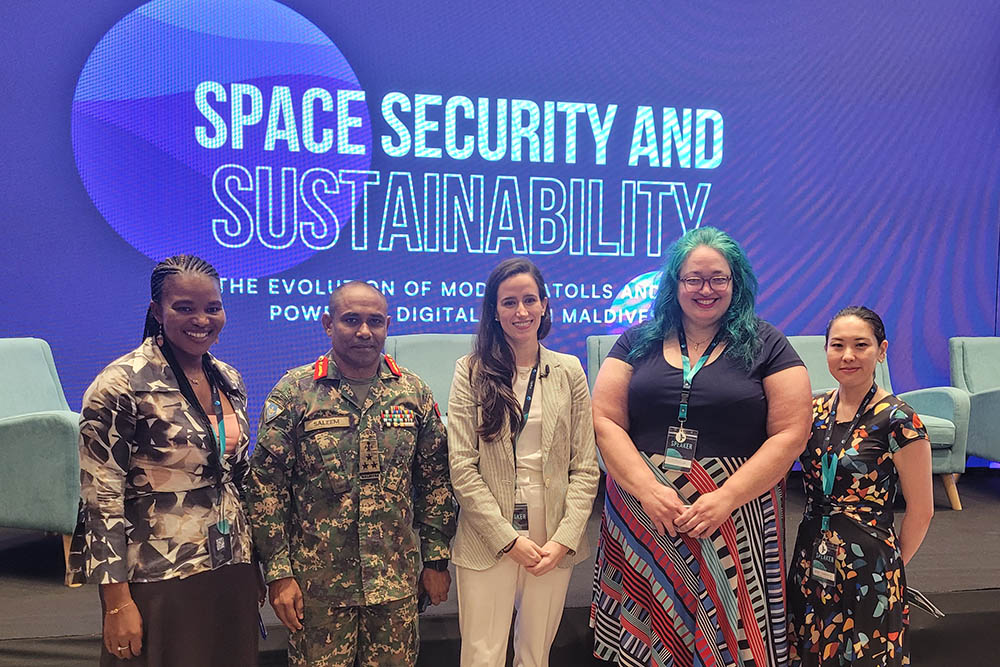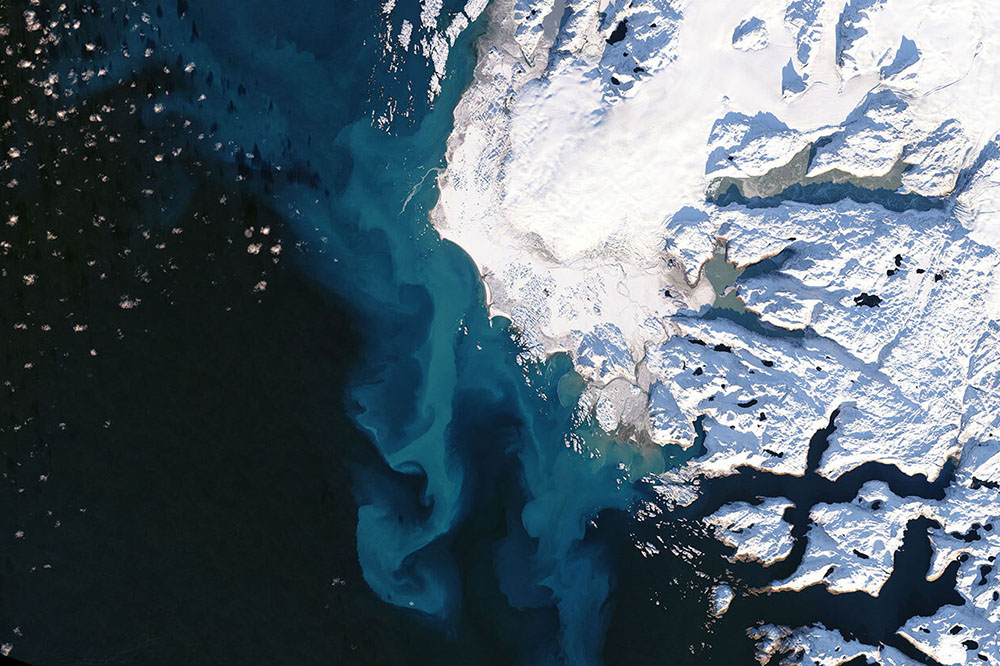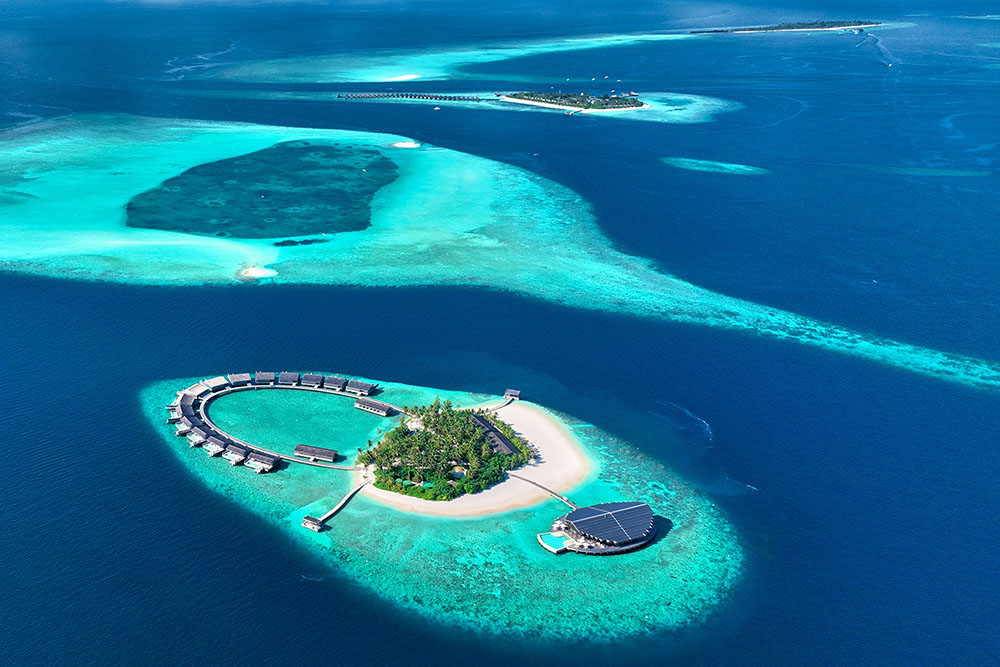Outer space is critical for humankind. All countries, irrespective of whether they are spacefaring or not, rely on space services on a daily basis. The rapid increase of space activities by new and commercial actors, including the extensive applications and potential uses of space-enabled data, have made possible multiple services upon which humankind relies every day.
In light of this, the Maldives Space Research Organisation (MSRO) convened the second annual Space for Island Nations Conference (SINC), bringing together experts, thought leaders and practitioners to spread awareness about the potential of space exploration and its benefits for island communities.
There were three key themes of SINC 2024:
- Space for climate, or specifically how space technologies play a role in climate monitoring and adaptation efforts for small island geographies in the face of changing environmental parameters due to climate change
- Space for space, or how small island nations can leverage space science and exploration for their future development.
- Space for the oceans, looking both at how space technology plays a role in oceanography and also how small island nations may draw parallels from their maritime experience to outer space.
Through the multitude of insightful panels at SINC, it was apparent how integral space technology was to the well-being and future of island nations.
As part of this second edition of SINC, the United Nations Institute for Disarmament Research (UNIDIR) and the Secure World Foundation (SWF) co-organized an open panel entitled Space Security and Sustainability: Why is it Essential for Small Island Nations?, where space security experts and other interested stakeholders explored the importance of space security for island nations as an integral component of space sustainability. In light of the potential and applications of space technology discussed for island nations, the panel focused on how island nations should consider space security and what role these nations can play in ensuring a sustainable future space environment.

UNIDIR and SWF, in coordination with MSRO, also co-organized a closed, invitation-only workshop for governments and other relevant stakeholders. This workshop facilitated an exchange of views on space security, provided a forum for informal discussion around current challenges to space security and stability, and explored the role that island nations could play in fostering a common understanding of space security.
To encourage a frank exchange of ideas, the workshop was a closed event for representatives of island nations, convened under the Chatham House Rule, which stipulates that “participants are free to use the information received, but neither the identity nor the affiliation of the speaker(s), nor that of any other participant, may be revealed”. A separate report detailing the highlights of the closed discussion will be published on UNIDIR’s website. This commentary summarizes key takeaways from the open panel discussion.
Space and Development Goals for Small Island Nations
The panel highlighted the essential developmental role that space technology provides for island nations. Space technology could be a critical enabler in achieving several of the United Nations Sustainable Development Goals (SDGs). For instance, space technology plays a role in many oceanic-resources management and preservation efforts that are vital to the continued livelihood and prospective economic growth of island nations. These efforts include but are not limited to: coral preservation efforts through early warning systems to detect coral bleaching; monitoring coastlines for coastal conservation; monitoring oceanic pH and acidity levels; monitoring illegal, unregulated and unreported fishing; and detecting oil spills.
One panellist also highlighted how Earth observation (EO) data specifically assists in environmental disaster monitoring and response, which is increasingly important due to the unique and intensified vulnerabilities faced by small island nations amidst the growing climate crisis. Moreover, EO is inherently non-discriminatory in nature as it provides access to data from traditionally inaccessible areas – an aspect of key importance for the future of small island nations. A variety of programmes exist which offer EO data for free, such as the Copernicus programme. The work of The Pacific Community, specifically the Digital Earth Pacific project, was presented as a concrete example of how EO data utilized at the local level could help in overcoming regional challenges such as climate change, food security and disasters.
Understanding Space Threats and Their Implications for Island Nations
Panellists discussed how working towards and ensuring the security of space systems is tied to the ability of States, including small island nations, to benefit from the services these assets provide. The ever-increasing relevance of space systems, coupled with limitations in existing international law, have made it possible for technologies and techniques to deny, disrupt, degrade, damage or destroy such space systems and their components. As underscored by one panellist, the development, testing and use of these counterspace capabilities are particularly concerning in the context of current geopolitical tensions. If left unchecked, they could even lead to conflict in outer space, which would have devastating consequences for humankind.
A panellist highlighted that counterspace capabilities can take many forms: they can be offensive and defensive and can further be classified into different groups including kinetic physical, non-kinetic physical, electronic and cyber. The proliferation of these counterspace technologies endangers both the safety and security of outer space, creating an unstable and unsustainable space environment. Participants stressed that small island nations are in a particularly vulnerable position with regard to the dangers of the proliferation of counterspace capabilities. Space services significantly contribute to economic growth and healthy marine ecosystems, and small island nations increasingly rely on space technologies, thus making their loss due to a space security threat an issue of particular concern. In this context, panellists linked space security to sustainability, suggesting that the former serves as a foundation for the latter.

Space Sustainability as a Multistakeholder Initiative
In exploring the roles of stakeholders, primarily those from the private sector, one panellist explained that according to the Outer Space Treaty, a State Party bears international responsibility for its national space activities, including activities carried out by non-governmental actors. Therefore, commercial actors are under the authority of their State’s domestic law and regulation in addition to international law. Progressive and sustainable updates in policy and regulation could help encourage and enforce more sustainable practices from industry actors, such as the European Space Agency’s Zero Debris Charter or the United States’ Federal Communication Commission’s rule for satellite operators to shorten the time for deorbiting non-geostationary orbit satellites from 25 years to 5 years.
However, in the absence of robust State regulation, stakeholders have the opportunity to develop guidelines that could enhance space sustainability through voluntary best practices. Raising greater awareness of the relationship between space security and sustainability through discussion on topics such as space debris and its indiscriminate effects could further incentivize sustainable outer space activity and generate social pressure towards sustainable practices locally and globally.
The Role of Space for National Security in Small Island Nations
Small island nations find themselves with a variety of different challenges, including maintaining sovereignty, safeguarding their waters, detecting illegal contraband, managing climate disasters, and combatting illegal, unregulated and unreported fishing. Space-enabled data and services provide a modern solution to fight illegal activities and ensure continued access to marine resources that are important for the economies of island nations.
Moreover, island nations are inherently maritime nations that need to connect over vast and remote areas. For instance, the Maldives is 298 square kilometres of land in roughly 90,000 square kilometres of ocean. Therefore, telecommunication satellites enable communications that are crucial for connecting remote islands, facilitating everything from national security to emergency response and rescue operations.
One panellist provided a nuanced perspective, highlighting that some island nations, such as the Maldives, should consider their strategic locations and proximity to influential geopolitical players. It was cautioned that such proximity could put pressure on small island nations in light of rising geopolitical tensions. It was explained that when carrying out military activities involving their territorial waters, small island nations were finding it increasingly important to strengthen cross-government engagement to incorporate space technology for safeguarding maritime zones. Through such steps, island nations, such as the Maldives, could contribute to regional security.
However, to reap the benefits of space technology for development, national security and economic security while also contributing to multilateral discussions on space security and sustainability, island nations would need to invest in human capital, especially their young people. In addition, island nations could seek diplomatic partnerships, training and information exchange with allies in the space sector to further establish localized expertise and capacities.


